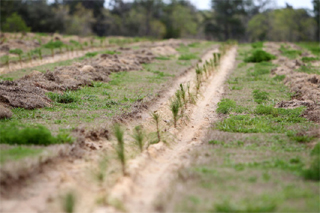|
Article Courtesy of The Tampa Bay
Times
By Dan DeWitt
Published April 8, 2016
For a decade, Hans "Pete" Moschinger had easy access to a
famously scenic and tough golf course, and a view from his house of the
not-so-tough fifth hole.
"It was an easy hole," said Moschinger, 74. "It was a pretty open hole. You
could easily get a birdie or a par."
|
The vista from
Moschinger's back yard is no longer a manicured and expansive
fairway, but a freshly plowed field supporting ankle-high weeds
and pine seedlings.
In a declining market for golf, the closing of courses — even
acclaimed ones such as the Dunes, north of Weeki Wachee — is not
unusual. Neither is the action of Dunes owner Nachum Kalka:
converting land approved for development to agriculture for the
right to claim a deep cut in property taxes.
But the combination of the two is rare, leading neighbors to
question why the county cannot prevent a land use that they say
has devalued their property and their quality of life.
"I know I've lost 30 percent" of his home's value, Moschinger
said. "But that is not what bothers me. What bothers me is that
we especially moved here to play golf and enjoy the rest of our
lives, and then this happens." |
|
Small pine trees are planted in rows in what was once the
fifth fairway of the Dunes. Residents say the planting seems to be a
sure sign the course closing is permanent.
|
The Dunes, previously called Seville, opened to rave reviews in 1987. The golf
writer for the Times called it "nothing short of breathtaking." It was designed
by famed golf course architect Arthur Hill, the story continued, and "lies on
150 acres of the most diverse and unspoiled land in Florida."
And after a renovation in 2007, said Brooksville lawyer Bruce Snow, an avid
golfer, "it was as good a layout as there was in the county, including World
Woods," referring to a club with two courses regularly rated among the country's
top 100.
But if the remote location, just south of the Citrus County line, gave the
course its natural beauty, it hindered the development of the surrounding
community, which retains the Seville name and was intended to supply the course
with golfers.
It has passed through several owners, including a previous company controlled by
Kalka that in 2005 sold the development for $45 million to a company that got
approval to build 3,811 homes on the property.
So far, only 23 homes have been built, and Kalka's current company, New Seville
2011 Development LLC, bought the land back in 2010.
The sluggish development and the declining popularity of golf led to the Dunes'
temporary closure in 2013. Though it reopened late that year, it ceased
operation again in June 2015, Moschinger said.
Kalka, who lives in Citrus County, did not respond to a request for comment. But
Seville landowners say the sudden appearance of a pine-planting crew a month ago
seems a sure sign the closing is permanent.
"You wake up in the morning, with absolutely no notification, and all of a
sudden you see a tree farm," Frank Chiapperino told the County Commission on
March 8.
Chiapperino and several other property owners showed up at the commission's
meeting to complain about Kalka's action and what they said was the county's
reluctance to stop it.
Assistant county administrator for planning and development Ron Pianta and
assistant county attorney Joe DiNovo said at the meeting and in later interviews
that the county is prevented from acting by the state's "right to farm" act.
That law says local governments cannot block farming "on land classified as
agricultural."
The golf course is designated by the county as part of a planned development
project, with allowed uses that include residential and recreation, Pianta said.
But Kalka, who has already received an agricultural classification for most of
Seville's 1,033 acres, has applied for the same greenbelt designation on the 180
acres of the Dunes course.
That would likely reduce the annual property tax bill on the course from $21,000
to $500, according to the county Property Appraiser's Office.
Kalka has also submitted a forestry plan to the state Department of Agriculture
and Consumer Services. Either the tax designation or regulation by the state
would impede the county's ability to regulate the property's use, DiNovo said.
Also, counties historically have had little luck preventing property owners from
receiving the deep greenbelt tax discount on land that has been approved for
development, DiNovo said.
But Moschinger's neighbor, Bruce Tobin, noted that the landowners near such
properties usually don't face the same steep declines in property values as
Seville residents.
Tobin says the loss of the fairway view is partly to blame for his inability, so
far, to sell his 2,200-square-foot home for the $204,900 asking price.
Also, he pointed out that neither of the actions the county says prevent it from
challenging Kalka — the greenbelt designation or the acceptance of the forestry
plan — have been finalized.
"Isn't it unusual," he asked, "that you go ahead and plow it up before you get
approval?" |
